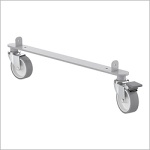Frequently, I am asked questions from people within the website Quora — I try my best to answer most — but candidly, there are too many. Here are some of my best answers to great questions concerning people's careers:
What is more difficult in the long run, working for a company or running your own business?
Both are difficult and rewarding in their own ways:
- Company - you have a boss to keep happy, you have set work hours, you get a regular paycheck, you get a paid location to work at, you get benefits, and you also get jerk bosses, the chance to lose your job instantly, cancelled projects, and frequently depressed coworkers.
- Business - you have a clients to keep happy, you have flexible work hours, your paycheck is based on how hard your work and hustle, you get to work at home, you get to pay for your own benefits, and you also get no jerk bosses (but jerk clients), the chance to lose your clients at the drop of a hat, cancelled projects, and you might be frequently depressed.
All kidding aside (but I was telling the truth) - both have their ups and downs, sometimes you feel in control with both, and sometimes you feel out of control with both.
I've done both - 20 years in corporate - 14 years coaching - and both are hard/easy, rewarding/frustrating, but all in all - it's a great ride.
My suggestion? Start a company.
How long does it take to settle in at a new job?
On average - 3-6 months. Not only do you need to meet, develop and hone relationships with key people, you need to learn the whole business - how it works, what are the levers/movers, what are the clients like, etc.
You also need to see how the company reacts to emergencies, slow-time, reactive decisions from management, and industry shifts.
I hate to say 'settle in', because when I'm settled, I'm bored. You need to constantly challenge yourself - do new things, meet new people, etc.
Where on their resumes might long-term unemployed job candidates address their current career gaps?
Are you not getting traction with your current résumé? (a lot of opportunities/recruiters/
If not, don't do anything. If so, and if the gaps are frequent and wide, you might want to fill in those gaps. Some suggestions:
- You didn't sit on the couch all day and watch Jerry Springer. You probably did something - volunteered, side job, etc. Let them know.
- Did you try to start a business? Did you do side work (consulting) that you were paid for? Let them know.
- If you really didn't do anything for a LONG time and your résumé isn't getting traction, you might say you helped out a sick family member at home - most of the time recruiters might ask a small question, but it's happening more and more every day as our population ages. I know this might be a 'white lie' and a fireable offense - but if you are consistently striking out, you have to do something to change the dynamic.
#3 might rankle some readers — but there are a lot of people who are lost right now looking for a replacement job and they've gone YEARS without employment.
What kind of advice would you give to a 40-something starting a new job where she'll be working alongside 20-somethings?
- Listen more than preach. You are not their 'sensei' right now, you just work with them. Also, be patient.
- Ask questions. They might know more than you do. And they probably do.
- Don't talk about your kids, your injuries, your parents, or any other 40+ year-old concern. 20 year-olds don't care.
- Don't try to 'be cool'. Be yourself. Be interested, but be yourself.
- Let them make their own mistakes. If they ask you for advice, then you give it to them. Ultimately, they will look to you as their 'sensei' if you do it right.
- Try to do things that they do. If they invite you out for drinks, go. If they mention a band, listen to them. If they talk about a movie, check it out.
- Compliment them. We tend to forget to do that with our younger counterparts.
- Work out, stay in shape, eat healthy, and keep a close eye on your wardrobe style. You don't want to dress like Lou in MadMen. Also keep an eye on your hairstyle.
- Look at your glasses style. Too many guys and gals wear really old frames they wore in high school. Get with the program and style up.
- Grow an interest in some of the things they might be interested in - music, movies, books, theater, etc. If you show a sincere interest in their passions, they might ask you about yours.
Extra-Credit: Keep up with TECHNOLOGY. I'm 52 and get so angry at people my age who have problems, disregard or disparage simple technology I use easily. YOU LOOK OLD immediately if you have frequent problems with email, the web, your phone (get a smartphone), etc.







